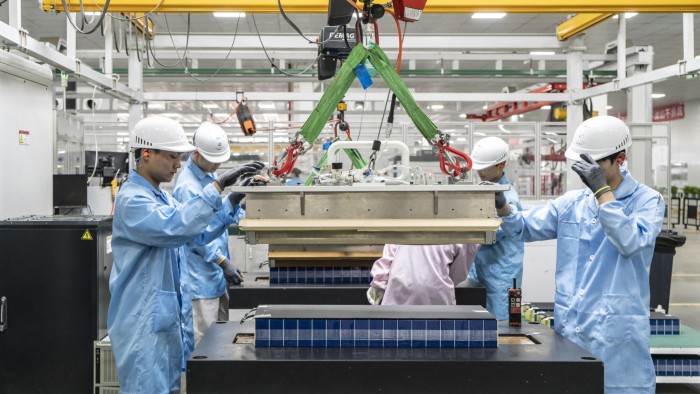Share this @internewscast.com
Stay informed with free updates
In July, two key economic indicators for China experienced a noticeable slowdown, stirring apprehensions regarding the robustness of the world’s second-largest economy amid both domestic and international trade challenges.
The National Bureau of Statistics revealed on Friday that industrial output increased by just 5.7 percent last month, marking the slowest growth since November and falling behind June’s 6.8 percent rate. Similarly, retail sales climbed by 3.7 percent, a decline from June’s 4.8 percent.
This disheartening data appears as the Chinese economy faces a protracted four-year slump in the housing sector and the repercussions of US President Donald Trump’s tariff disputes. These issues are placing pressure on Xi Jinping’s administration as it tackles the risks of deflation and heightened worries about industrial overproduction.
Data from the NBS on Friday indicated that new home prices in 70 major cities decreased by an average of 0.3 percent last month, continuing a recent trend of declines that have dampened hopes for a rapid recovery in the housing market.
In the past weeks, Beijing has targeted the issue of “involution,” referring to the excessive capacity within the country’s extensive industrial and manufacturing sectors, which policymakers hold responsible for triggering overproduction and declining prices.
Official data released last week showed consumer prices were flat year on year in July, while producer prices contracted 3.6 per cent.
Yuhan Zhang, principal economist at The Conference Board’s China Center, noted that “consumption momentum is easing as we reach mid-year,” attributing this to “a blend of waning post-holiday demand, sluggish income growth, and subdued consumer sentiment.”
Authorities have sought to boost consumer spending, offering subsidies for new parents and trade-in schemes for household appliances.
A spokesperson for the NBS on Friday cited the impact of “extreme weather” in July, including high temperatures and flooding.
Ting Lu, chief China economist at Nomura, said the property sector weakness was “the main culprit” for China’s deflationary pressures and suggested the anti-involution campaign “may not successfully reflate the economy” on its own.
He pointed to the prospect of demand shocks, low expectations of “mega stimulus programs” and “limited room to curb government investment funds”.
The property market, a crucial source of economic activity and household wealth, has proven resistant to government efforts to restore confidence. Policymakers have rolled out efforts including mortgage rate cuts, a pledge to convert unused apartments into social housing and the removal of restrictions on purchases.
Property investment is now down 12 per cent over the first seven months of the year. Separate data from the People’s Bank of China on Thursday showed an unexpected fall in overall new loans.
Fixed asset investment from January to July was up 1.6 per cent against the same period a year earlier, missing analyst expectations and down sharply from a 2.8 per cent reading the previous month.
Zhang said that, despite the broad investment slowdown, some manufacturing sectors were expanding rapidly, especially automobiles, railways, shipbuilding, aerospace and other transport equipment.
He said this indicated that policy-backed, high-tech and strategic sectors — industries linked to what policymakers call “new quality productive forces” — were “still attracting substantial capital, even as overall investment momentum weakens”.
China has relied on exports to support growth in recent years, which have remained strong in recent months, adding 7.2 per cent in July.
The US and China agreed to a further 90-day pause in their trade war this week, but economists have warned over the risk of weaker trade in the second half of the year.
“Looking ahead, we see little reason to expect much of an economic recovery during the rest of this year,” noted Zichun Huang at Capital Economics, adding that export growth was “likely to remain under pressure” given the prospect of high tariffs and “duties on rerouted shipments rising”.
Authorities have set a full-year growth target of around 5 per cent for 2025, in line with last year. GDP added 5.2 per cent in the second quarter on a year earlier.
Additional reporting by Wang Xueqiao in Shanghai and Cheng Leng in Hong Kong. Data visualisation by Haohsiang Ko in Hong Kong








